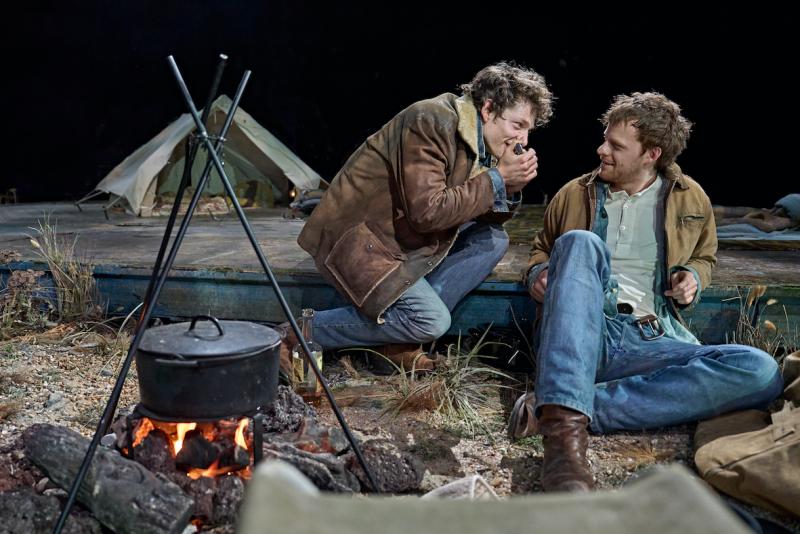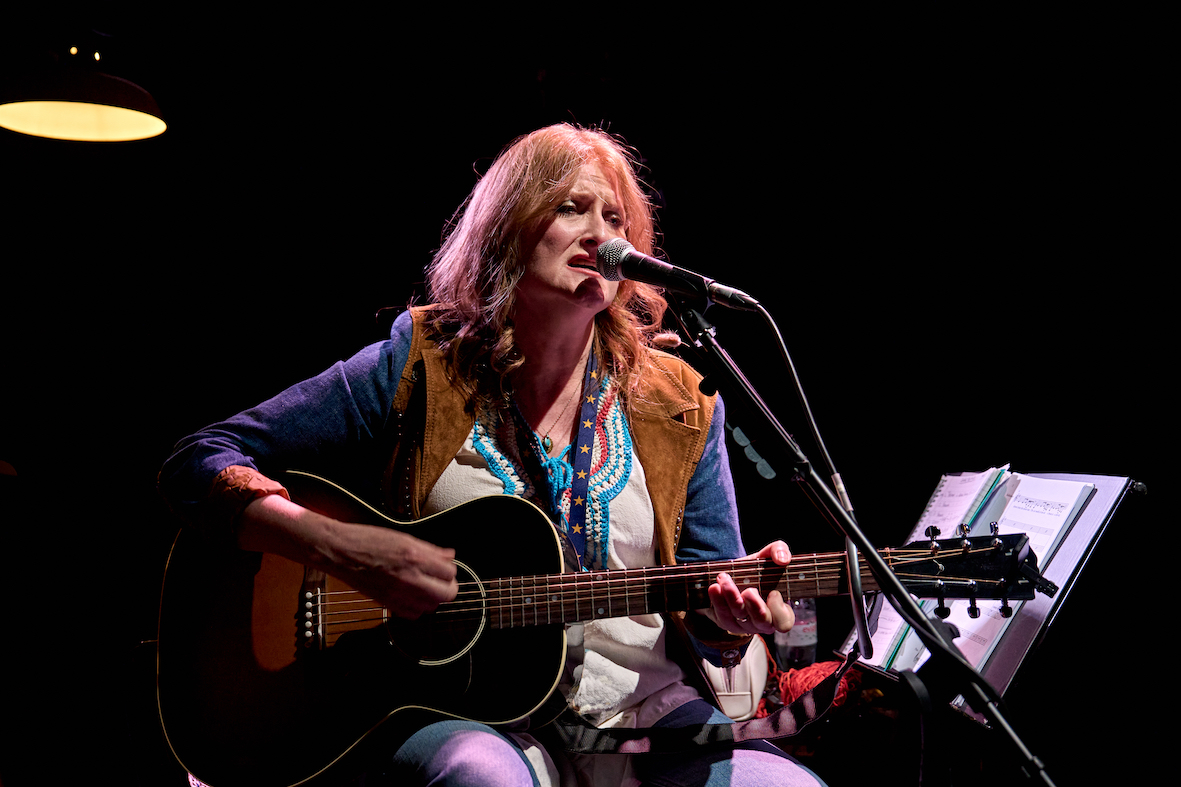Brokeback Mountain, @sohoplace review - emotionally inert take on acclaimed tale of queer love | reviews, news & interviews
Brokeback Mountain, @sohoplace review - emotionally inert take on acclaimed tale of queer love
Brokeback Mountain, @sohoplace review - emotionally inert take on acclaimed tale of queer love
Mike Faist and Lucas Hedges star in an underpowered adaptation of Annie Proulx's short story

For a masterclass in expansive adaptation, one could do worse than turn to Ang Lee’s Oscar-winning Brokeback Mountain, based on American author Annie Proulx’s 1997 short story of the same title. Proulx’s restrained but searing tale of the queer romance between two ranch hands in 1960s Wyoming generated in Lee's 2005 film a tragedy of deep interiority and complex emotion.
Eighteen years on, this source material faces a kindred, if altogether new, challenge in Ashley Robinson’s stage adaptation at West End’s @sohoplace, which comes with serious star wattage through its central cast of Mike Faist and Lucas Hedges — American actors making their West End debuts in the wake of acclaimed performances on Broadway and in Hollywood.
Robinson’s play nominally centres on an elderly Ennis Del Mar (Paul Hickey), who, in 2013, wistfully looks back on a 20-year period in his youth when he was embroiled in an affair with Jack Twist, even as the two men had wives and children. As young adults, Ennis (Hedges) and Jack (Faist) are employed as ranch hands on the titular Brokeback Mountain, whose secluded wilderness triggers their homosexual relationship and, through the years, becomes a site of nostalgic longing. At a time of rampant homophobia, the two men sustain their passionate connection in the shadows, or, more accurately, in the welcoming embrace of nature — but not without having to confront the tragic fate ultimately dealt to their love.
Directed by Jonathan Butterell, Brokeback Mountain functions as a memory play, where the older Ennis keenly watches in his mind’s eye a rapid succession of brief scenes from this story. These moments are punctuated by a dozen original songs written by Dan Gillespie Sells and performed on stage by a country band featuring Eddi Reader as a balladeer (pictured below). Tom Pye’s versatile set, foregrounding a few pieces of furniture and a peripheral campsite, brings together and accommodates these scattered episodes with help from David Finn’s mellow lighting design. In a story that sets such great store upon the enabling force of its natural landscapes, however, this scenic world fails to evoke or convey any visual sense of its key settings.
 These deficiencies of ambience are compounded by other issues afflicting this lightweight transposition of Proulx’s story to the stage. Notwithstanding their prior accolades, Hedges and Faist struggle to inhabit their respective characters with the conviction and nuance merited by their tempestuous inner lives. Hedges’ boyish charm seems persistently at odds with the taciturn nature and quiet resentment of Ennis, especially as the character has to navigate the thorny terrain of a dysfunctional marriage. Faist’s jocular take on the more affable Jack is apposite in the early portions of the play, but his tonally erratic performance doesn’t quite capture the character’s quiet agony over the years. As a result, the chemistry between the two actors feels off-mark, making the central relationship appear to be driven by physical attraction only, rather than a profound emotional connection.
These deficiencies of ambience are compounded by other issues afflicting this lightweight transposition of Proulx’s story to the stage. Notwithstanding their prior accolades, Hedges and Faist struggle to inhabit their respective characters with the conviction and nuance merited by their tempestuous inner lives. Hedges’ boyish charm seems persistently at odds with the taciturn nature and quiet resentment of Ennis, especially as the character has to navigate the thorny terrain of a dysfunctional marriage. Faist’s jocular take on the more affable Jack is apposite in the early portions of the play, but his tonally erratic performance doesn’t quite capture the character’s quiet agony over the years. As a result, the chemistry between the two actors feels off-mark, making the central relationship appear to be driven by physical attraction only, rather than a profound emotional connection.
That Robinson’s underpowered text doesn’t allow these characters to gain depth is partly to fault here. The brevity of the scenes has a filmic quality to it, and there are many instances when one can’t help but feel that this is an adaptation not so much of Proulx’s story as of Lee’s film. While the soulful country songs are clearly intended to fill these psychological gaps, the conversion of the older Ennis into a full-blown narrator-figure would have served this purpose much more effectively. It’s a shame that the band’s fine musical work feels theatrically detached from the drama unfolding on stage, too. Emily Fairn, as Ennis’s wife Alma, and Martin Marquez, playing the supporting male characters, give a welcome sense of the key figures in Ennis and Jack’s joint tale, but their performances feel similarly constrained by the slim opportunities allowed them.
This could have been an exhilarating opportunity to reimagine Proulx’s acclaimed story with distinctly theatrical resources and in bold ways. Instead, what we witness is an artistically conservative and emotionally inert replay of prior material. While this poignant study of queer love and homophobia still feels sadly relevant to our times, it surely deserves a more gripping and vigorous reinterpretation for the stage.
The future of Arts Journalism
You can stop theartsdesk.com closing!
We urgently need financing to survive. Our fundraising drive has thus far raised £49,000 but we need to reach £100,000 or we will be forced to close. Please contribute here: https://gofund.me/c3f6033d
And if you can forward this information to anyone who might assist, we’d be grateful.

Subscribe to theartsdesk.com
Thank you for continuing to read our work on theartsdesk.com. For unlimited access to every article in its entirety, including our archive of more than 15,000 pieces, we're asking for £5 per month or £40 per year. We feel it's a very good deal, and hope you do too.
To take a subscription now simply click here.
And if you're looking for that extra gift for a friend or family member, why not treat them to a theartsdesk.com gift subscription?
more Theatre
 Ragdoll, Jermyn Street Theatre review - compelling and emotionally truthful
Katherine Moar returns with a Patty Hearst-inspired follow up to her debut hit 'Farm Hall'
Ragdoll, Jermyn Street Theatre review - compelling and emotionally truthful
Katherine Moar returns with a Patty Hearst-inspired follow up to her debut hit 'Farm Hall'
 Troilus and Cressida, Globe Theatre review - a 'problem play' with added problems
Raucous and carnivalesque, but also ugly and incomprehensible
Troilus and Cressida, Globe Theatre review - a 'problem play' with added problems
Raucous and carnivalesque, but also ugly and incomprehensible
 Clarkston, Trafalgar Theatre review - two lads on a road to nowhere
Netflix star, Joe Locke, is the selling point of a production that needs one
Clarkston, Trafalgar Theatre review - two lads on a road to nowhere
Netflix star, Joe Locke, is the selling point of a production that needs one
 Ghost Stories, Peacock Theatre review - spirited staging but short on scares
Impressive spectacle saves an ageing show in an unsuitable venue
Ghost Stories, Peacock Theatre review - spirited staging but short on scares
Impressive spectacle saves an ageing show in an unsuitable venue
 Hamlet, National Theatre review - turning tragedy to comedy is no joke
Hiran Abeyeskera’s childlike prince falls flat in a mixed production
Hamlet, National Theatre review - turning tragedy to comedy is no joke
Hiran Abeyeskera’s childlike prince falls flat in a mixed production
 Rohtko, Barbican review - postmodern meditation on fake and authentic art is less than the sum of its parts
Łukasz Twarkowski's production dazzles without illuminating
Rohtko, Barbican review - postmodern meditation on fake and authentic art is less than the sum of its parts
Łukasz Twarkowski's production dazzles without illuminating
 Lee, Park Theatre review - Lee Krasner looks back on her life as an artist
Informative and interesting, the play's format limits its potential
Lee, Park Theatre review - Lee Krasner looks back on her life as an artist
Informative and interesting, the play's format limits its potential
 Measure for Measure, RSC, Stratford review - 'problem play' has no problem with relevance
Shakespeare, in this adaptation, is at his most perceptive
Measure for Measure, RSC, Stratford review - 'problem play' has no problem with relevance
Shakespeare, in this adaptation, is at his most perceptive
 The Importance of Being Earnest, Noël Coward Theatre review - dazzling and delightful queer fest
West End transfer of National Theatre hit stars Stephen Fry and Olly Alexander
The Importance of Being Earnest, Noël Coward Theatre review - dazzling and delightful queer fest
West End transfer of National Theatre hit stars Stephen Fry and Olly Alexander
 Get Down Tonight, Charing Cross Theatre review - glitz and hits from the 70s
If you love the songs of KC and the Sunshine Band, Please Do Go!
Get Down Tonight, Charing Cross Theatre review - glitz and hits from the 70s
If you love the songs of KC and the Sunshine Band, Please Do Go!
 Punch, Apollo Theatre review - powerful play about the strength of redemption
James Graham's play transfixes the audience at every stage
Punch, Apollo Theatre review - powerful play about the strength of redemption
James Graham's play transfixes the audience at every stage
 The Billionaire Inside Your Head, Hampstead Theatre review - a map of a man with OCD
Will Lord's promising debut burdens a fine cast with too much dialogue
The Billionaire Inside Your Head, Hampstead Theatre review - a map of a man with OCD
Will Lord's promising debut burdens a fine cast with too much dialogue

Add comment